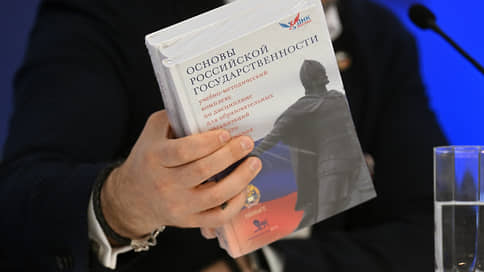Teachers praised the new training course “What is Russia?” with the help of sociologists and two students
[ad_1]

The Expert Institute for Social Research (EISR), together with the “Russian DNA” project, held a round table on Thursday on the topic “What is Russia?” The stated question looked very philosophical, but the discussion turned out to be more practical and once again centered around the course “Fundamentals of Russian Statehood” that had recently started at universities. To defend it from potential critics, the experts used not only their own theses, but also an appeal to sociology and the opinions of students – only two, though.
The moderator of the round table held at the MIA Rossiya Segodnya site, political scientist and teacher of Fundamentals, Pavel Danilin, immediately tried to link the topic and content of the discussion through the title of the first section of the course, which is called “What is Russia?” “I don’t teach how to love one’s homeland correctly, I teach why and for what one can love it,” the political scientist struck a high note. Later, he recounted how he clearly explained to students the importance of understanding the geopolitical situation: they say that if they open a hotel in England, they may go broke.
Vice-Rector of RANEPA and, in fact, the main coordinator of the development of “Fundamentals,” Andrei Polosin, once again said that the course is aimed at developing the right values in students. “Values are formed in connection with assessment. And assessment arises in connection with the knowledge and skills that a person has acquired. Evaluation forms the framework of values. “The Fundamentals of Russian Statehood is a set of knowledge that allows students to conduct an assessment,” Mr. Polosin explained somewhat floridly. He later resorted to language that was more understandable to young people, saying that the course was essentially a “meaning hub” for freshmen.
Mr. Danilin suggested watching a video with students’ opinions about the course. There were only two speakers, and their feedback was entirely positive. “First of all, the course broadens your horizons,” explained the fair-haired young man. According to him, he did not know many things about the “political and national” structure of Russia, and when he found out and became acquainted with the opinions of philosophers and historians, he understood why “certain events have happened” now. A student at Yaroslavl State University, in turn, spoke about her impressions of the lecture dedicated to the achievements of Russia: “It talked about what important dates influenced the history of our country. I was even surprised: I forgot about a lot, and didn’t even know about a lot.”
VTsIOM representative Mikhail Mamonov undertook to reinforce the positive image of the course with sociology. According to him, public opinion’s assessments of “Fundamentals” are generally “complimentary,” although they are of a “vague advance nature.” The sociologist made these conclusions from a survey published the day before: 68% of respondents believe that the course is needed, and 72% would like it to be taught to their children and grandchildren. Opposite opinions were expressed by 16% and 11%, respectively. Mr. Mamonov also presented data on how the respondents substantiated their position. Thus, among supporters of the course, the leading answer was: young people should know the basics of statehood (32%). In second and third place were the opinions that students should know the history of their country (24%) and that “Fundamentals” will help increase patriotism and love for Russia (17%). Among those who oppose the course, 28% call it useless, believe that it is unnecessary, contains unnecessary information and will not be useful in life. 17% consider it propaganda and “imposition of opinion,” and 16% indicate that students already receive the information it contains from other subjects such as history and social studies.
The rest of the round table participants also could not resist praising him. Thus, Igor Kuznetsov, a professor at the Department of History and Theory of Politics at Lomonosov Moscow State University, noted that “Fundamentals” perform the function of “secondary socialization of adults.” “As part of the course, we form an image of the past and set the coordinates for the future,” added Vladimir Shapovalov, deputy director of the Institute of History and Politics at Moscow State Pedagogical University.
Towards the end of the discussion, Pavel Danilin remembered the question stated as the topic of the round table, and admitted that the experts did not give an answer to it. Therefore, the political scientist did it himself: “I personally formulate it as follows. Russia is our homeland, state, country, civilization, our ancestors, us and our descendants.”
[ad_2]
Source link








